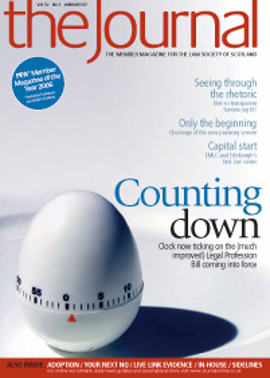Believe in the future

I was very pleased to be invited by my old friend, Ruthven Gemmell, the President of the Law Society of Scotland, to speak to you this morning. It is a privilege to have the opportunity to address young lawyers at the start of their professional careers and to be able to share the pride which your parents and families must feel at your success.
In speaking to you today there are three themes that I want to emphasise. They are opportunity, service and confidence. I will speak briefly on the first two as I want to concentrate on the third theme, that of confidence.
The first theme is opportunity. Opportunity is what young lawyers have today. Your qualification can open doors in private practice, in which many of you may choose to spend at least part of your careers. It enables you to work in central or local government, in Edinburgh’s substantial financial services sector or elsewhere in business or industry. It qualifies you for jobs in the voluntary sector and can be a way of starting an academic career. Some of you may choose to join the Faculty of Advocates, as I did after my apprenticeship – I was among the last of that tribe, having trained as a solicitor with Ruthven Gemmell in Brodies between 1980 and 1982. Significantly, you are not confined to Scotland but there are openings for the dynamic professional in London, in Europe and further afield. Once qualified as a Scots lawyer, it is not difficult to convert to qualify in the law of other jurisdictions.
Taking the criticism
Whatever direction you choose for your career, I hope that you will put service to your clients or to the institution which employs you at the heart of your work. This is my second theme. There is now much ill-informed criticism of lawyers. But such criticism is not a new phenomenon. When reading history at university in the south I studied, among other things, Tudor and Stuart political and social history. And I remember reading of the anger of Tudor moralists against the lawyers of their day. Their description which I recall was that lawyers were “leeches of the Commonweal”. No doubt the lawyers of that time were an easy scapegoat for ills that were not of their making. Some things do not change.
Lawyers should expect to be subjected to ill-informed criticism; the practice of centuries is not likely to stop overnight. But what is important is that we all strive to serve those for whom we work so that clients, employers or whomever we serve get good value for money. You must also earn and retain the trust not only of your clients but also of your colleagues with whom you negotiate or against whom you appear in court. Lack of trust in any society or in any walk of life increases transactional costs. It wastes clients’ money.
Value for money is not merely a question of the level of fees that you may receive for your work. That is only one side of the balance. The other side is the quality of service that you provide. If you know and can apply in a practical way the law in the field in which you work, if you keep abreast of the changes in that field of law so that your advice is up to date, if you analyse thoroughly the problems that you are asked to solve and come up with practical answers to them, then you will have provided a valuable service and will be entitled to reasonable remuneration. If you give such a service and charge reasonable fees for that service, you may still be criticised. That may be irritating, but you have the comfort of knowing that it is not informed criticism. If you provide a good service at a reasonable cost, if you do right by your client, you will be in a strong position to defend your practice and your profession against ill-informed criticism.
Engage in public debate
My third and principal theme is confidence. I have chosen that theme because there are many in both branches of the profession who are seriously concerned about the future of the legal profession. Whether it is the Clementi proposals or the Legal Profession and Legal Aid (Scotland) Bill or the proposals in the Executive’s consultation paper which purport to strengthen judicial independence that cause concern, many consider that the profession is facing unprecedented challenges from both the Scottish Executive and the Scottish Parliament. These developments are not confined to Scotland. Throughout the United Kingdom questions are being asked about the future structure of the profession and whether it is appropriate that the profession should no longer police itself but be subjected to the supervision of a public regulatory body.
I believe that the profession as a whole should respond with confidence to these challenges. It was and is right that the leaders of the Society and the Faculty of Advocates sought and seek to engage in the public debate and present their views to executive and legislature, in an attempt to persuade them to amend proposals which they perceive as misguided or unfair. It is right also that individual members of the profession should consider the issues with an open mind. Are there areas of practice which it is appropriate should be subjected to public regulation? Would the control of complaints by a public body enhance the confidence of the public in the profession, or would it unduly erode the independence of the profession? What is the best way to strengthen the independence of the judiciary and thus safeguard the rule of law?
It is healthy in a civil society and in a profession to debate these issues openly. It is also healthy to accept the inevitability of change, to be willing to adapt to change and, importantly, to seek to exercise some control or at least some influence over the process of change. This means engaging in the public debate about the profession, and doing so with confidence. If some people in the profession speak as if they were walking down Princes Street carrying placards which state “The End of the World is Nigh”, do not be afraid to walk in the opposite direction with your own placard which states “Not if I can help it”.
Lawyers in the modern world
You have reason to be confident in the face of change. Lawyers have a vital role to play in the complex structure of modern capitalist societies, both in bringing about necessary changes which the executive government and the legislature wish to introduce and also in protecting the individual against powerful organisations, whether they be the state or a large commercial organisation.
In 2001 in his presidential address to the David Hume Institute, the former Lord Chancellor of Great Britain, Lord Mackay of Clashfern, gave a thoughtful and spirited defence of the legal profession in a text which merits reading, entitled “Are Lawyers Parasites?” (David Hume Institute Occasional Paper no 59). He pointed out that modern society is complex and requires to be governed by detailed rules. He concluded that the legal profession gave services that were necessary for a just and peaceful society and that those services were not disproportionately rewarded having regard to their value.
Whatever balance is struck between public regulation and the ability of the profession to set its own professional standards, I believe that an independent legal profession is an important part of a healthy civil society. It would not be a healthy development for there to be a national legal service with all lawyers employed by the state. Fortunately, such a suggestion is not part of the present debate. The independent profession provides what some sociologists describe as “bridging social capital”, an important and coherent social grouping in an atomised society other than a government body.
No need to apologise
I see no need for the profession to apologise for its independence; quite the contrary. On reading the account of the recent conference on “Balancing the Scales of Justice” in the Society’s Journal I was struck by the comments of Sternford Moyo, the former President of the Zimbabwe Law Society, in which he observed that an independent profession was a necessary underpinning of the independence of the judiciary. The independence of mind of the practitioner is an important attribute which trains lawyers to think independently as judges.
Finally, I would urge you not to be apologetic about the profession’s defence of human rights. In a society in which people have concerns over immigration, asylum seekers, international terrorism and, increasingly, home-grown terrorism, it is easy for some commentators to get a receptive audience when pillorying human rights law as being too focused on the rights of the individual at the expense of the rights of wider society, or as being an alien legal import into Britain.
But they are wrong on both counts. First, human rights law seeks to set a fair balance between the interests of the individual and the interests of wider society. In many cases the interests of society prevail over the individual’s rights: see, for example, A v Scottish Ministers 2002 SC (PC) 63. Secondly, many of the principles of the European Convention on Human Rights are derived from the British constitutional tradition. In the terrorist suspects case A (FC) v Secretary of State for the Home Department [2004] UKHL 56, Lord Hoffmann stated at para 88:
“I would not like anyone to think that we are concerned with some special doctrine of European law. Freedom from arbitrary arrest and detention is a quintessentially British liberty, enjoyed by the inhabitants of this country when most of the population of Europe could be thrown into prison at the whim of their rulers. It was incorporated into the European Convention in order to entrench the same liberty in countries which had recently been under Nazi occupation. The United Kingdom subscribed to the Convention because it set out the rights which British subjects enjoyed under the common law.”
Those rights were won by brave lawyers, brave litigants and brave judges. The legal profession in Britain has a good story to tell. You are now part of that story; and you should not be afraid to tell it.
In this issue
- The Isle of Man
- Contractual handcuffs: enhanced redundancy rights
- Strength of purpose
- Cleared for take-off
- Countdown phase
- A quiet revolution
- Acting your age
- Adopting new solutions
- Clear as mud?
- Majoring in minorities
- Believe in the future
- Appreciation: Dr J Stuart Fair
- Grow your own assistant
- On the radar
- Status of the expert's report
- Rewarding experience
- Restructuring - in hindsight
- Court rules catch up with live link TV
- Scottish Solicitors' Discipline Tribunal
- Website reviews
- Book reviews
- Top notch training
- A clearer way to deal
- Not the best option
- Letting in the disabled
- Single survey: have your say






